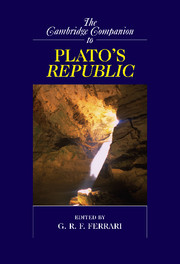Book contents
- Frontmatter
- 1 The Protreptic Rhetoric of the Republic
- 2 The Place of the Republic in Plato’s Political Thought
- 3 Rewriting the Poets in Plato’s Characters
- 4 Wise Guys and Smart Alecks in Republic 1 and 2
- 5 Justice and Virtue: The Republic’s Inquiry into Proper Difference
- 6 The Noble Lie
- 7 The Three-Part Soul
- 8 Eros in the Republic
- 9 The Utopian Character of Plato’s Ideal City
- 10 Philosophy, the Forms, and the Art of Ruling
- 11 Sun and Line: The Role of the Good
- 12 Beginning the “Longer Way”
- 13 The City-Soul Analogy
- 14 The Unhappy Tyrant and the Craft of Inner Rule
- 15 What Is Imitative Poetry and Why Is It Bad?
- 16 The Life-and-Death Journey of the Soul: Interpreting the Myth of Er
- Bibliography
- Index of Passages
- Index of Names and Subjects
- Series List
5 - Justice and Virtue: The Republic’s Inquiry into Proper Difference
Published online by Cambridge University Press: 28 November 2007
- Frontmatter
- 1 The Protreptic Rhetoric of the Republic
- 2 The Place of the Republic in Plato’s Political Thought
- 3 Rewriting the Poets in Plato’s Characters
- 4 Wise Guys and Smart Alecks in Republic 1 and 2
- 5 Justice and Virtue: The Republic’s Inquiry into Proper Difference
- 6 The Noble Lie
- 7 The Three-Part Soul
- 8 Eros in the Republic
- 9 The Utopian Character of Plato’s Ideal City
- 10 Philosophy, the Forms, and the Art of Ruling
- 11 Sun and Line: The Role of the Good
- 12 Beginning the “Longer Way”
- 13 The City-Soul Analogy
- 14 The Unhappy Tyrant and the Craft of Inner Rule
- 15 What Is Imitative Poetry and Why Is It Bad?
- 16 The Life-and-Death Journey of the Soul: Interpreting the Myth of Er
- Bibliography
- Index of Passages
- Index of Names and Subjects
- Series List
Summary
The Republic is traditionally subtitled “On Justice,” and when we begin reading the dialogue, it seems clear that justice is to be its central topic. Book 1 in fact could be read as an independent dialogue specifically about justice, on the model of those Platonic dialogues devoted to the discussion of single topics, topics such as piety in the Euthyphro, the highly elusive sōphrosunē in the Charmides, or understanding in the Theaetetus. So we might imagine Book 1 as an aporetic dialogue with a central eponymous character and dedicated to an investigation of justice, a dialogue entitled perhaps “Thrasymachus” with the subtitle “On Justice,” the subtitle that Thrasyllus in fact gave to the entire Republic.
But as we read further into the dialogue, and particularly as the argument begins to develop in Book 2, the focus of the discussion appears to shift to a larger concern, a concern with the general topic of virtue, and specifically virtue in relation to individual happiness. When I was first introduced to the Republic as a student, I was told that it is about this question of the relation of virtue to happiness, either in the form of the question of the rewards of virtue or in the form of the cognate question of whether there is a conflict between duty and interest. It is in terms of this larger question that the dialogue is often presented; the surface question remains one concerning the nature of justice, but the larger question that is seen to emerge is some version of the question of whether virtue is sufficient for happiness.
- Type
- Chapter
- Information
- The Cambridge Companion to Plato's Republic , pp. 116 - 137Publisher: Cambridge University PressPrint publication year: 2007
- 19
- Cited by

